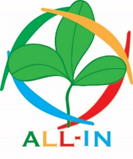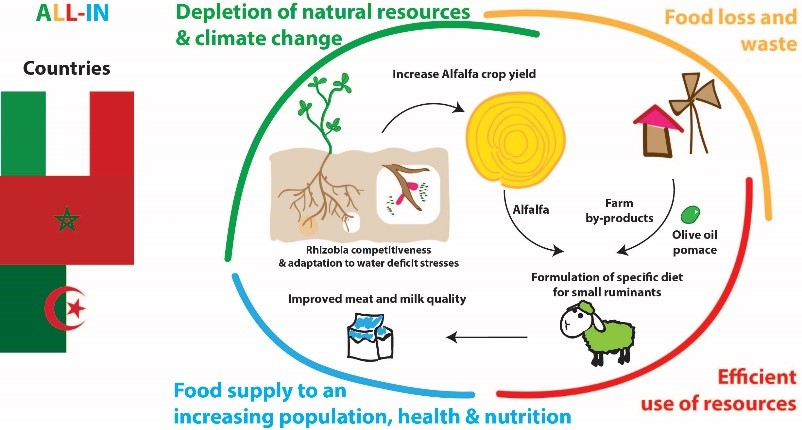ALfalfa for sustainable Livestock farming systems: Improve alfalfa -rhizobia symbiosis and New feeding strategy based on ecological leftovers
Introduction
The development of Local Sustainable Food Societies is a key factor to face emerging issues linked to pollution and climate change.
The primary goals of ALL-IN are the increment of alfalfa (Medicago sativa L.) crops yield and the formulation of a balanced diet for livestock based on alfalfa and integrated with local by-products. The development of local sustainable food societies through efficient use of resources. Molecular and bioinformatics approaches permit new strategies for the selection of elite rhizobial inoculants able to enhance alfalfa yield. Ameliorating the production of leguminous plants and using them in combination with by-products is a sustainable strategy to reduce the huge quantity of resources for animal-derived food production. The focus of the project is in the Mediterranean area.
Background
In the future years, it is expected an increase in milk, and meat derived products demand. It is then necessary to develop a new feeding strategy for animals and improve feed production not incrementing the amount of lands used and without the introduction of anthropogenic fertilization. Medicago species are cultivated at different latitudes thanks to their versatility (e.g. drought and disease resistance); considering the forecasted increment of temperature, selection of highly competitive rhizobia adapted to more stressful conditions (e.g., high salt concentration) is fundamental to improve inoculant efficiency.
Main project activities
The primary goals of the project are the increment of alfalfa (Medicago sativa L.) crops yield in the Mediterranean area thanks to the development of new rhizobial inoculants and the formulation of a balanced diet for livestock based on alfalfa and integrated with local agriculture by-products. The accomplishment of the first aim requires the selection of rhizobial strains on the basis of three main phenotypes: symbiotic efficiency (high nitrogen fixation rate), high competition capabilities and resistance to dry environments. The second goal is centred on the formulation of diets for ovines (which are widely bred in the Mediterranean area) coupling agro-food by-products and alfalfa, thus decreasing the production of farm bio-wastes. In vitro fermentation trials will be performed to select optimal diets. Selected diets will be further evaluated in the in vivo feeding trials in terms of animal performance, rumen microbiota composition, milk and meat quality.
Expected results
The results of this project will improve the competitiveness of legume crops by considerable savings of expensive inputs, contributing to enhancing the agriculture competitiveness of the countries in the Mediterranean area. Increased production of legumes will reduce actual needs for importation in some cases, whereas in others it will increment the exportation to demanding markets.
Increase alfalfa production will allow using it as a central component for livestock feeding. The feeding strategy is based on the principle of “ecological leftovers”. Diets will be designed to optimize the reuse of bio-wastes (scraps and harvest residuals of local by-products) especially those obtained from olive oil manufacturing (i.e., pomace). The addition of specific amounts of olive oil pomace will allow modulating rumen metabolism improving milk and meat quality and possibly reducing methane emission.
Keywords
Legume crop yield, Nitrogen fixation, Livestock, Milk & Meat, Climate change, alfalfa
Project consortium
Coordinated by:
- UNIFI - Carlo Viti University of Florence – Italy
Partners:
- INRA - Khalid AzimINRA RABAT – Morocco;
- UNIPI - Marcello Mele - University of Pisa/Centro Ricerche Agro-ambientali "E. Avanzi» - Italy;
- UORAN - Abdelkader Bekki - University of Oran – Algeria;
- UM I- Majida Hafidi - University Moulay Ismail – Morocco
Funding institutions:
-
Ministero delle politiche agricole alimentari e forestali /Ministry of agriculture food and forestry policies- Italy
- Ministère de l'Education Nationale, de la Formation Professionnelle, de l'Enseignement Supérieur et de la Recherche Scientifique - Département de l'Enseignement Supérieur et de la Recherche Scientifique - Morrocco
- Ministry of Higher Education and Scientific Research, Directorate-General of scientific research and technological development - Algeria
More information
ALL-IN project website: http://www.all-inproject.com/
Twitter: @CarloViti5
Presentations
- Kick-off project meeting - February 2021
- Solutions innovantes pour l’utilisation des légumineuses dans un scénario de changement climatique
- ALL-IN contribution newsletter 2021
- Mid-term project meeting - November 2022
Publication
Video

